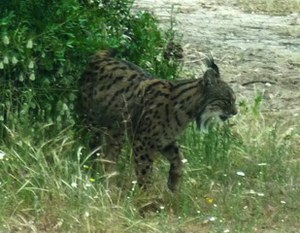For the first time a lynx photographed in the Apennines
The specimen, an adult individual, was photographed of April 19 after the 7 pm, in the wildlife and hunting territory of the company "Sasseto Mortano", in the municipality of Santa Sofia, by the lawyer Gian Raniero Paulucci of Forlì.The photos were taken at the edge of an old cart road, at an altitude of 400 m asl, characterized by woods, bushy ravines, pastures and cultivated fields, rich in ungulates (deer, wild boar), hares, pheasants and partridges, all animals within the food spectrum of this predator.In the past two decades several sightings of lynx had been reported in the Tuscan-Emilian and Tuscan Romagna Appenin, without having any documented evidence.The presence of lynx in this region probably comes from individuals released into the wild by humans in recent years, because the species was considered extinct in Italy since the seventeenth century. Also immigration from Alps, where there are very few examples, seems unlikely for geographical, environmental and demographic reasons.

